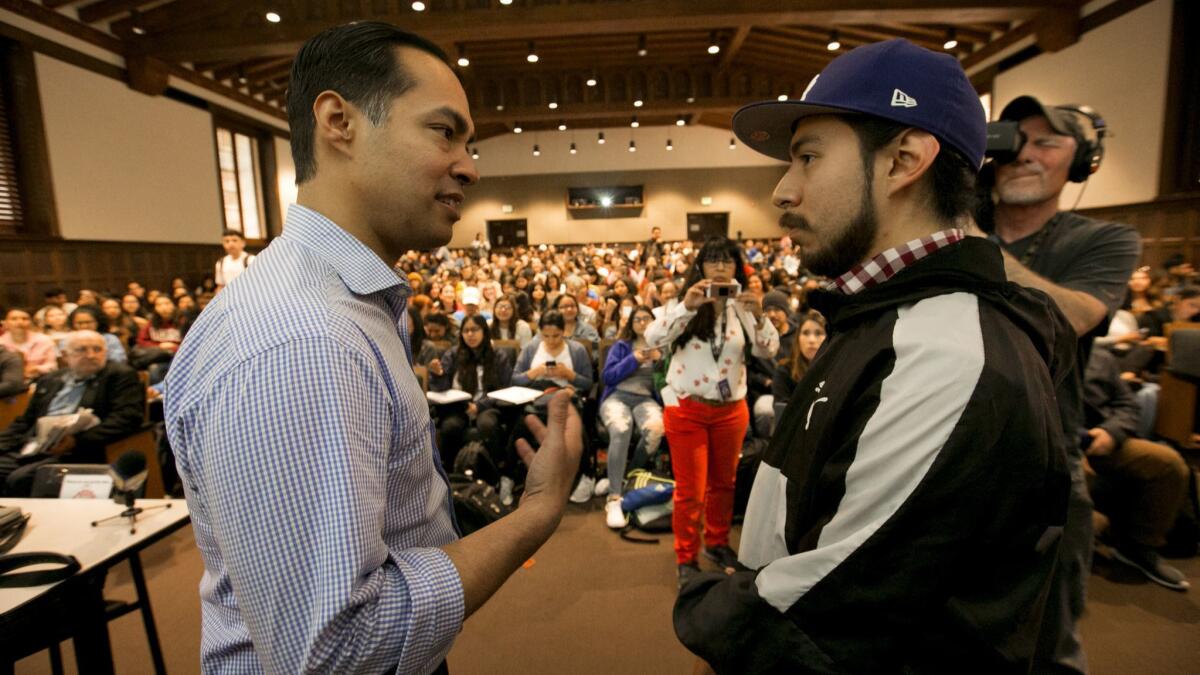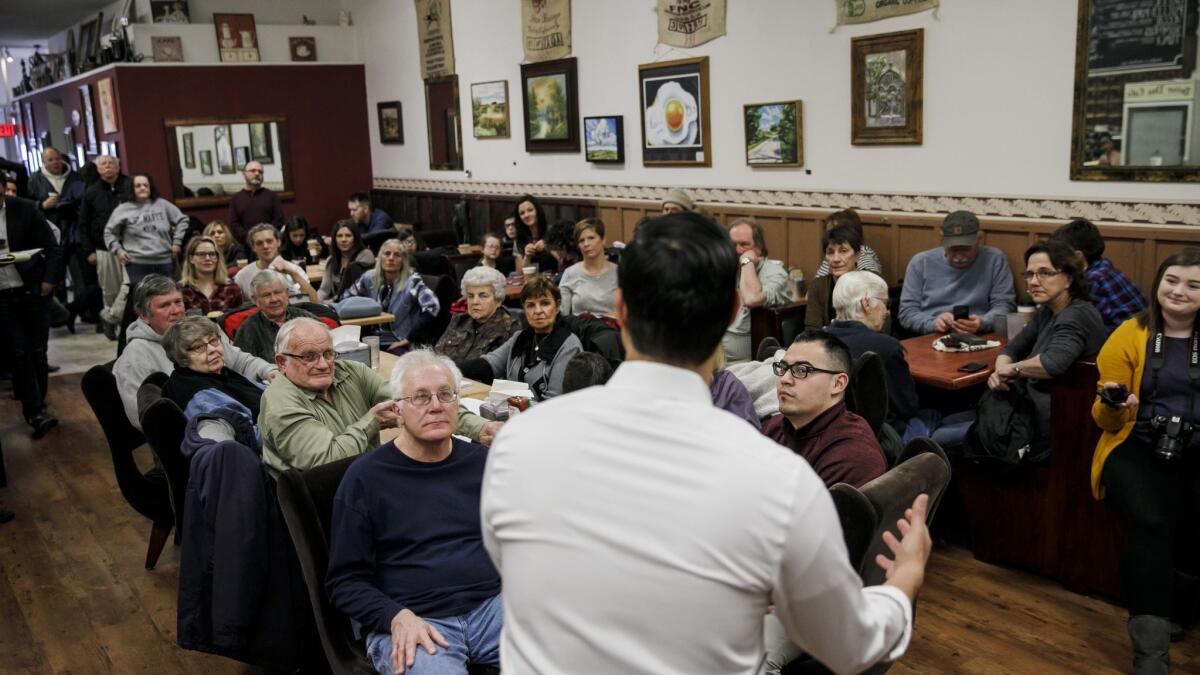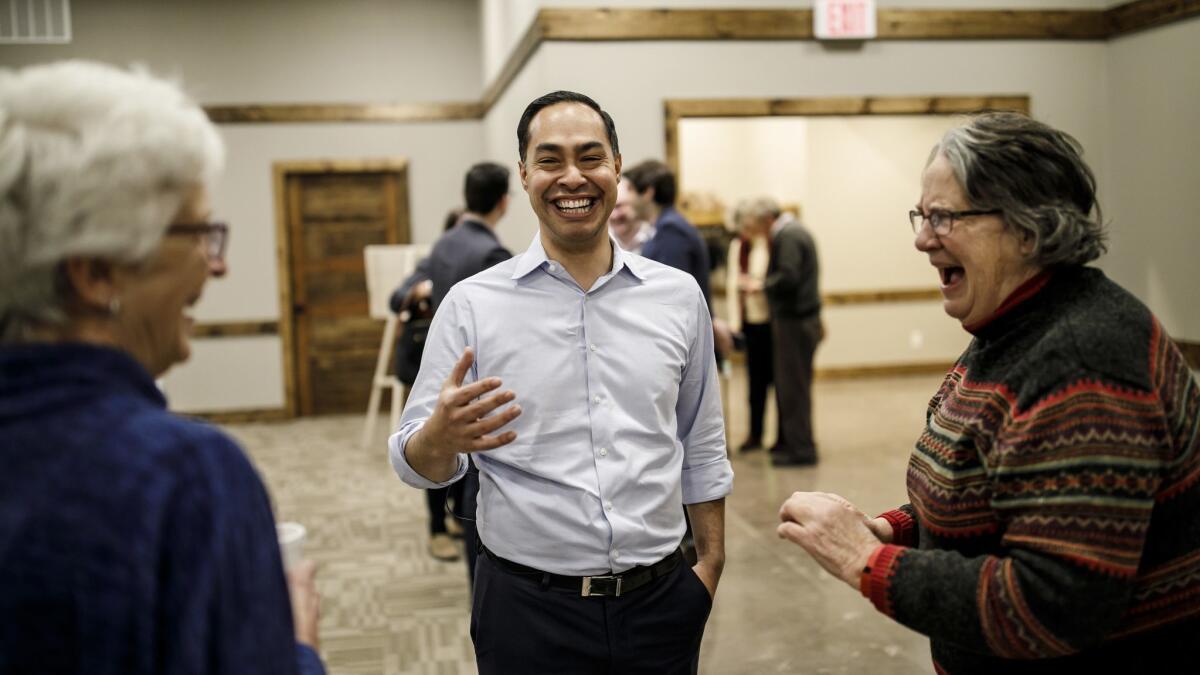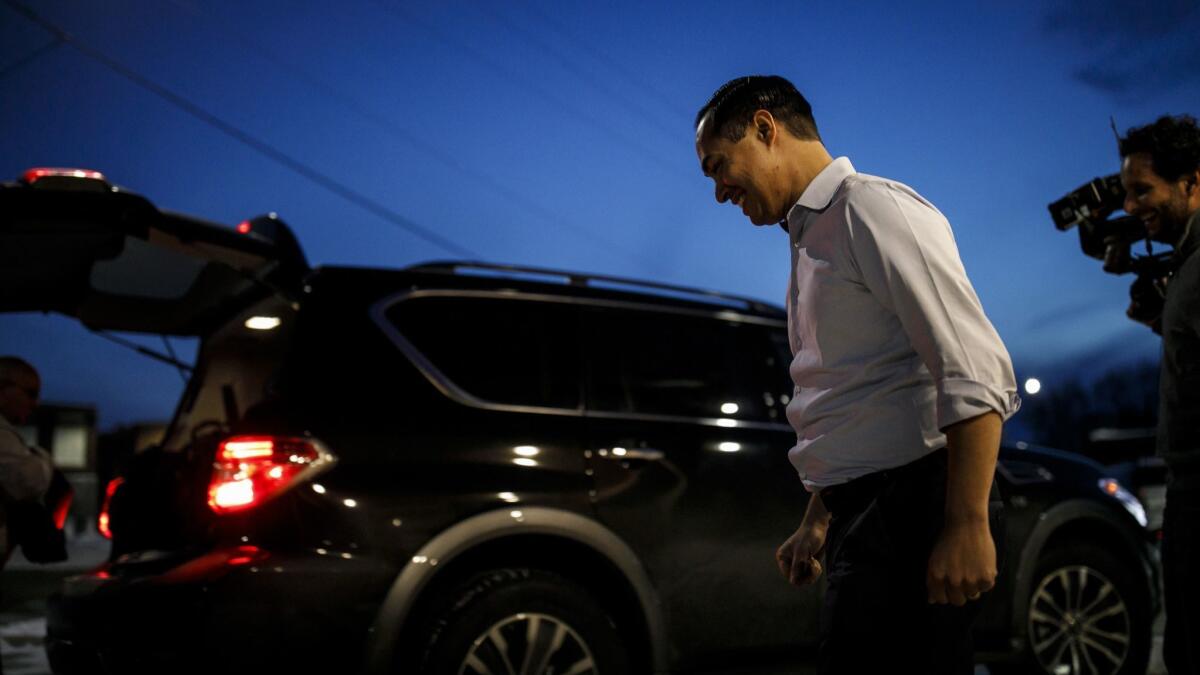Julian Castro’s run for president banks on Latinos, but it’s a steep climb to White House

With more than a dozen Democrats now vying for president, Julian Castro is charting a path unlike any of the others, as his visit to California on Monday made clear.
The former San Antonio mayor and Housing secretary under President Obama took questions from a Chicano studies class at UCLA. He did a television interview with Univision anchor León Krauze. In South L.A., he led a roundtable of black and Latino neighborhood activists.
Castro holds the distinction of being the only Latino in the race at a time when many Democrats are appalled by President Trump’s fight to block immigrants from entering the U.S. from Mexico.
So Castro, whose grandmother immigrated from Mexico, has set his sights on scoring delegates in states with big Latino populations, among them California, Nevada and Texas.
But the first states to hold 2020 presidential contests ‚ÄĒ Iowa and New Hampshire ‚ÄĒ are overwhelmingly white. Candidates who fare poorly there are often eclipsed by front-runners and forced out of the race before voting starts in more diverse states.
The next contest, in Nevada, requires a mighty campaign operation that Castro, so far, has shown no sign of assembling. Even if he consolidates Latino support in states that vote later, Castro could fall well short of what he needs.
‚ÄúIt‚Äôs important from a historical perspective, but in the nuts and bolts of winning the nomination, a purely Latino candidacy is not going to make it,‚ÄĚ said Roberto Suro, director of USC‚Äôs Tom√°s Rivera Policy Institute. ‚ÄúTo give him credit, I don‚Äôt think he‚Äôs basing his entire campaign only on the Latino vote. The challenge here is whether a Latino-oriented campaign can have broader appeal.‚ÄĚ

Castro, 44, emerged on the national stage in 2012, when Obama picked him as keynote speaker for the Democratic National Convention. Hillary Clinton vetted Castro to be her running mate in 2016, but ultimately passed on him.
Castro has long emphasized the emotional pull of his immigrant family’s rise out of poverty in San Antonio. He and his identical twin brother, Texas Rep. Joaquin Castro, each earned bachelor’s degrees at Stanford University and law degrees at Harvard University.
Castro has vowed to campaign in all 50 states to show that ‚Äúeverybody counts.‚ÄĚ His overarching goal, though, has been to build support among Latinos and younger voters.
His first campaign stop was Puerto Rico, an alluring source of delegates. Last week, he spoke in Salt Lake City to MEChA, the Chicano student group, and met in North Las Vegas with ‚ÄúDreamer‚ÄĚ immigrants brought to the U.S. illegally when they were children.
On a recent trip to Iowa, Castro stuck to rural Republican counties with pockets of Latino and Asian immigrants drawn largely by jobs in dairies and meatpacking plants. The small crowds that turned out ‚ÄĒ just five people at Cronk‚Äôs Restaurant and Lounge in Denison ‚ÄĒ were nearly all white.
‚ÄúDo you find that people are hesitant to get involved and step forward?‚ÄĚ Castro asked Beth Ann Vogt, the Crawford County Democratic leader.
‚ÄúAbsolutely,‚ÄĚ she told him.

Castro hopes to engage enough Latinos to expand the pool of voters in the Iowa caucuses. He describes himself as the ‚Äúantithesis of Donald Trump.‚ÄĚ
‚ÄúI try to bring people together instead of tearing them apart,‚ÄĚ he told about 75 Democrats at a house party in Sioux City.
Like most of his rivals, Castro calls for rejoining the Paris agreement to fight climate change, offering Medicare to all Americans, rooting out racial bias in the criminal justice system and raising taxes on the rich. He supports a surge in foreign aid to Mexico and Central America modeled on the Marshall Plan, the U.S. program to rebuild the economies of European allies after World War II.
Carlos Valle, a student at Iowa State University in Ames, was one of the few Iowans who pledged during Castro’s recent trip to support him in the caucuses.
‚ÄúI understand the struggle he‚Äôs grown up with, the son of a single mom,‚ÄĚ Valle said after an eggs-and-sausage breakfast with Castro and a couple dozen Democrats in Carroll, Valle‚Äôs hometown.
For now, Castro is stuck in a lower tier of candidates facing better-known and, most likely, better-funded rivals, such as Sens. Kamala Harris of California, Elizabeth Warren of Massachusetts and Bernie Sanders of Vermont. That higher echelon will soon expand if former Vice President Joe Biden and former Rep. Beto O’Rourke of Texas join the race.
O’Rourke, who rocketed to fame when he nearly unseated Republican Sen. Ted Cruz, poses an especially big threat to Castro, because the two would compete for money and political support in their home state.
If Castro survives Iowa and New Hampshire, Nevada will be the first contest in a state where Latino voters have clout. But its caucuses require a big network of organizers. The Culinary Workers Union, a political powerhouse that represents the Las Vegas Strip’s mainly Latino hospitality workers, is known for its pragmatism in politics. Its support is hard to get.
‚ÄúNevada is probably the only place where he‚Äôs got to do well ‚ÄĒ and can do well, given the Latino population there,‚ÄĚ said Joe Velasquez, a Castro supporter who was political director for a better-known Latino, Bill Richardson, when he ran for president in 2008. Richardson quit the race two days after he was trounced in the New Hampshire primary.

Beyond Nevada, California’s primary will be one of the hardest. The state’s millions of Latinos strongly favor Democrats, but ethnic solidarity is less common in California than it used to be. Antonio Villaraigosa, the first Latino mayor of modern Los Angeles, finished third in last year’s gubernatorial primary.
‚ÄúBeing a Latino in California is no guarantee of anything,‚ÄĚ said Suro of USC. ‚ÄúThe Latino electorate in California is a fairly sophisticated electorate that‚Äôs used to competitive elections, and they don‚Äôt even turn out for someone who‚Äôs a favorite son.‚ÄĚ
Castro‚Äôs No. 1 obstacle here is Sen. Harris, who has won three statewide elections ‚ÄĒ twice for attorney general and once for U.S. Senate. She has already won endorsements from the state‚Äôs top Democrats, including Gov. Gavin Newsom.
‚ÄúHarris is going to blow him out of the water,‚ÄĚ Suro said. ‚ÄúShe‚Äôs got this state locked up from top to bottom already.‚ÄĚ
On Monday, though, Castro tried to make inroads with the students at UCLA.
‚ÄúHe has a really strong connection with young Mexican American students,‚ÄĚ said Matt Barreto, a pollster and political science professor who teaches the UCLA class.
Kevin Calderon, 27, an American literature student from Oxnard, asked Castro whether he would hold Trump administration officials accountable for separating families of immigrants at the U.S.-Mexico border. Castro promised that he would.
‚ÄúI consider what they‚Äôve done basically to be state-sponsored kidnapping, in many instances,‚ÄĚ he said. ‚ÄúInhumane ‚ÄĒ in fact, it borders on criminal.‚ÄĚ
It was just what Calderon wanted to hear. ‚ÄúHe has a vision of the country,‚ÄĚ Calderon said, ‚Äúthat resonates with the students here on campus.‚ÄĚ
More to Read
Get the L.A. Times Politics newsletter
Deeply reported insights into legislation, politics and policy from Sacramento, Washington and beyond. In your inbox three times per week.
You may occasionally receive promotional content from the Los Angeles Times.











